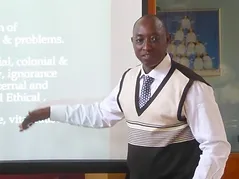Diversity of State Energy Programs in the US: Causes, Consequences, Possible Remedies
September 14, 2022
The Covid-19 Pandemic: Magnifier of Inequality
October 7, 2021
The Forum explored the effects of the pandemic on inequality and analyzed emerging proposals to reduce inequality as part of a strategy to overcome the pandemic. The main finding was that the pandemic’s effects on inequality have been severe, multiple, vary by country, and have had a particularly strong impact on the poor and vulnerable.
Managing Artificial Intelligence in a Violent World
March 4, 2021
Thirty-nine participants, a number of whom were experts in the field, discussed trends in this rapidly growing area and implications for violent as well as beneficial impacts. GPS hopes to sponsor similar forums on other current topics with implications for nonviolent and violent outcomes.
GPS Workshop on Nonviolent Action: Concept and Practice
GPS Presentation on Peacebuilding in Africa: Opportunities and Challenges
Takoma Village (6827 4th Street, NW in Washington, DC)
March 2, 2019
Speakers
For some 50 years, the people of Colombia suffered through prolonged internal armed conflict. In November 2016, a Peace Accord was signed and many around the world rejoiced. But implementation of the Accord has faced an array of challenges, and developments in neighboring Venezuela have only added to the difficulties in moving the peacemaking process ahead.
Global Peace Services USA convened a searching look at whither the Colombia Peace Process and its prospects going forward. Aiding us in understanding the path so far taken and possible future scenarios, are two men with deep personal investments in the success of the Peace Accord and its sustainability. From their respective vantage points, they shared their special insights into how the Peace Accord has impacted on people’s lives on the ground in Colombia.

Join us for a conversation with Mary Cheh, DC City Councilmember, Ward 3; Eric Coffman, Chief, Office of Energy and Sustainability, Montgomery County; and John Morrell, Energy Manager, Office of Sustainability & Environmental Management, Arlington County. The three will discuss what their jurisdictions are planning and doing to reduce their carbon footprints, adapting what they cannot mitigate, and considering how they might collaborate with each other and with state level activities. This panel has been convened by the Global Peace Services USA, in collaboration with the Center for Environmental Policy in AU’s School of Public Affairs.

At a time of ongoing conflict and wars — declared and undeclared across the world — on June 17th, 2017, Global Peace Services USA, had the good fortune to hear from a well-seasoned researcher and peace activist on promising approaches to developing leadership for peace and reconciliation.
Father Innocent B. Rugaragu, SJ, PhD, a Jesuit priest from Kigali, Rwanda, met with members and friends of GPS in the Washington, DC area to discuss the findings from his recently completed doctoral dissertation on Leadership for Peace and Reconciliation in Post-Violent Sub-Saharan African Countries: Ethical Pragmatism. Fr. Innocent, who was awarded his doctorate by George Mason University in May 2017, conducted extensive interviews as part of his research — meeting with leaders in a variety of fields in Ghana, Kenya, Nigeria, Rwanda, Tanzania and South Africa.
He assessed the many theories put forward to define the qualities for effective leadership — with particular attention to the qualities needed for furthering peace and reconciliation — and developed his own theory, based on his research findings, of ethical pragmatism as a critical leadership tool.
Fr. Innocent, who will be returning in July to Rwanda will be devoting his efforts there to establishing a center promoting leadership for peace and reconciliation, teaching and conducting research, as well as fostering community organizing by the poor and those in need. Fr. Innocent will also be devoting his considerable energy to continuing his Jesuit spiritual and ministerial work in the priesthood.
American University (AU) School of International Service (SIS)
April 5, 2016
Speakers
Event Summary
Panelists discussed the future of climate policy after Paris, with a special focus on the developing world, adaptation, and NGO influence. You can see full event coverage here.